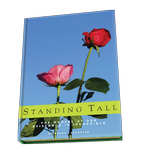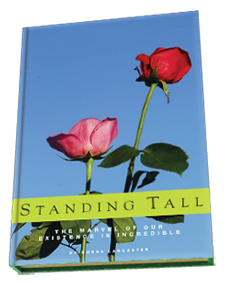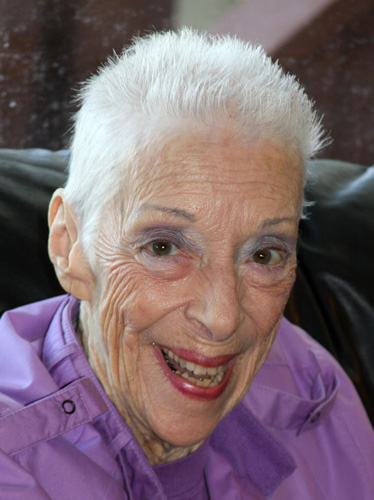ALONG THE WAY:
The sense of urgency is lethal.
THIS MONTH’S THOUGHT:
Happiness is when we don’t want to change anything.
SCHOOL TALK #53- LIVING WITH STRESS:
(Excerpts from a talk by Dr. Bob Gibson. The information in the 60-minute tape is priceless, so it be in the next three newsletters)
Today we will talk about living with stress. It seems that most everybody manages to have a reasonable amount of stress. We can make stresses out of about anything we choose to do so over. We can make it over work. We can make it over other people. We can make it over transactions of various kinds. We can make it over relatives. We can make it over non-relatives. About all it takes to make a good stressful situation in our inner feelings is to know how things ought to be. And, of course, they are never quite that way. Then we can get very stressed about that. Now we want to make it clear there is more than one way, besides inner feeling, to have stress. I get calls from people many times a day from all over the country and they are all about a stressful situation. Most of them assume it must be their inner feeling. Now, there are other ways. You can get environmental stresses from jolts, jars, falls, constant noise, obnoxious odors, possibly even extremes of temperature, either cold or hot. We can have inner feeling stresses, which we will talk about a bit today. We can also have activity stresses. Seldom would any of us would overwork, but there are people who do it. We can also be under active. That probably fits most of us better. You just don’t have enough activity to keep the body in circulation even, must less doing well. Nutrition. By looking around I don’t think there’s very many here who are malnourished, from the standpoint of not having enough. Maybe we over do it a wee bit and have over amount of intake of food, because it’s fun to eat, not because we’re hungry. Any of these can be stressful and they can all require adaptation to stress. Now the adaptation to stress is what is ordinarily called disease. I have a hard time saying it’s like it’s commonly used—disease—that’s a thing. Dis-ease means you’re not at ease. Disease has been twisted around to mean some kind of critters are floating around up there in the sky or somewheres else. They look down and say there’s old Chuck. I’m going to bite him. And they take after him. But that’s a misnomer. We are adapting to a stressful situation. That produces unusual sensations, first, which is uncomfortable – pain- and we all want to be comfortable. We get a little concerned about that. We keep it up long enough there is tissue cell alteration or breakdown, a change in the function, a change in the sensation and a change in the tissue. No matter what you name it, that what comes out. If you could tell me any other symptom anybody has had I like to hear about it. All of those are the normal adaptations to the state of stress. Should you have the misfortune to be all broken up with a bunch of broken bones and torn ligaments, they produce those same symptoms, also. Those are environmental stresses. You’re not going to get rid of them by eating the most perfect diet in the world, have the greatest inner feeling that ever came down the road and those injuries are still going to adapt a bit because they require a little mechanical assistance.
So, we’re going to talk about these stresses and how they work.
I’m going to draw a little drawing here of a very simple machine that was called a steam engine. This is a boiler. It had water put in it and capped up. They build a fire under it and that made a terrific amount of pressure from steam. Now they had wheels that turned on it. They had a whistle on it. They had a pop-off value that popped off if the pressure got too high. Now if we keep pouring the fire in here and we locked this wheel down, we tied the whistle rod down so it couldn’t blow and we welded the pop-off value shut, can you tell me what is going to happen to that boiler in a little while? It’s going to have a crack in it. That’s its symptoms. Now this is generally the way the human being works as well as the boiler.
So when you put the pressure on, you mobilize energy. Let’s say you get aggravated or annoyed at someone, but being the nice, wonderful, polite people we are we don’t say very much about it. We keep it inside and hold it down. That’s mobilizing energy to fight or run. That’s the appropriate response when you are stressed—to fight or run. We came from ancestors where that was their only survival. We have educated ourselves, so now we don’t have to do it. So we mobilize energy to fight or run. Now that we are civilized and educated and conditioned by things that says: we’ve got to please every body, we got to believe and do as told by your authorities, you’ve got to improve yourself, then that mobilized energy is held. We hold that energy which is mobilized and unreleased which requires, if you’re going to survive, adaptation. That adaptation is, first, unusual cellular activity. Some cells begin to do something they ordinarily don’t do. That doesn’t bother you too much. An unusual cellular activity produces unusual sensation. That you know very much about. You’re well acquainted with—pain, soreness, stiffness, fullness. You have unusual sensation. And that begins to be something that we mobilize energy for because the first thought is, “No doubt I’m going to have a stroke, or cancer, or maybe the first signs of AIDS even today. We just get real upset if we have something that is a little unpleasant. So, we mobilize energy to run from this terrible condition we just pictured in our mind. Did you ever build pictures of having brain tumors and all kinds of other things wrong with you? It’s frightening. You can scare yourself half to death with them. So how are you going to run from that? So that, of necessity, is held and mobilized energy and requires some more adaptation. So we go around and around this little circle that we sometimes refer to as the vicious cycle. We start off with a misconception. Then we have a false feeling of emergency. Then it goes to the physical level where we mobilize energy to fight or run. You don’t do either one, which requires the adaptation, which is the form of unusual cellular activity, unusual sensation. As long as it’s in that state, it is purely functional. There is no pathology. You go to the doctor and he looks you over from one end to the other and he says, “You don’t have anything wrong with you. It’s all in your head.” You need to see a shrink. You go along with this stuff. But you know he must have missed something. Finally if you keep this up long enough, the cells that are doing the unusual cellular activity cannot continue indefinitely doing something they weren’t designed for. Finally there is tissue cell alteration or a breakdown. Now you have a pathology. Now you have a visible sign. Your disorder has become respectable. The doctor can find something to account for it. You are no longer imagining it. You have some messed up cells. Now you are down to where you can do something about it. You can have them cut out. You can have them doctored many different ways. At least it’s respectable now. It’s out of the realm that it’s all in your head. You knew it was there all the time. They just didn’t discover it quick enough.
This accounts for all the symptoms in the world that all the human beings have. (To be continued next month)
A STORY:
The Teachings say that when we’re conscious, we write the script, director the part and play the role. (From School talk #4). Hummmm. That would make me responsible. Bummer! I have checked this out, mostly to disprove it because I didn’t like it. I found it is true for me. If I’m unconscious or asleep, I allow others to write my script for me. That doesn’t work either.
For instance: If I have too much to do, who takes it on? Me. If I have too little to do and I want to sit non-disturbed in my comfy chair, who’s responsible? Me. If things are not going MY way, who whines about being a victim? Me. I am the victim and the victimizer. I’m going to experience whatever happens to me, whether I like it or not. As Dr. Bob would say, “We might as well experience it gracefully.” Complaining, blaming or becoming angry, doesn’t change what is. They only keep me asleep.
Yes, I am responsible for my script. On the other hand, I’m NOT responsible for the scripts of others, as much as I would like to help them re-write theirs at times! However, most of the time it is a relief to mind my own business. When I realize they are writing their script (or others are writing it for them when they are asleep) I can look at them objectively, without judgment or condemnation and not block their way.
~~~~
This question was asked Dr. Bob during his lecture on Living with Stress:
Question: Living in a state of grace is very different from living in a state of stress. Would you comment on this alternative to stress, that is, living in this state of grace?
Answer: I’m talking about making ourselves very available to grace—not making things important, that’s grace; of being in charge of our own inner state of being and being in charge of my responses to circumstance. Now, that is grace that we even heard of those ideas, because basically people have been living thousands of years and an extremely small number of people have ever been reminded or brought up to where they could see that. So that’s where the grace comes in. The grace is undeserved good. I did nothing that I can think of to earn having come across the material many years ago and then being able to use it. That was pure unadulterated grace to me. We would have never stumbled upon it by ourselves. So we live by grace when we take advantage of the grace that’s been extended us—that we come across the material that makes it possible for us to live without being torn up in the usual state of stress that everybody lives in. And I’m very thankful for that grace.
A FEW THOUGHTS
- Never take life seriously. Nobody gets out alive.
- Life is…………..sexually transmitted.
- Give a person a fish and you feed them for a day. Teach that person to use the internet and they won’t bother you for weeks.
- Good judgment comes from bad experience and a lot of that comes from bad judgment.
- Do not walk behind me, for I may not lead. Do not walk ahead of me, for I may not follow. Do not walk beside me either. Just pretty much leave me the hell alone.
NOTICE: My book, The Short and Tall of It is now out on 4 cassette tapes -$24.95—narrated by the author.


